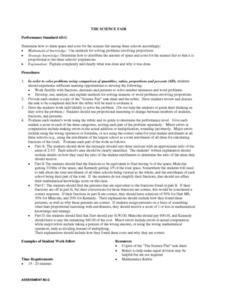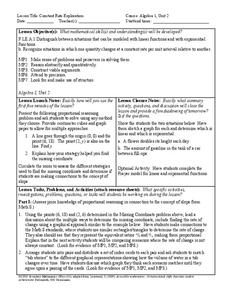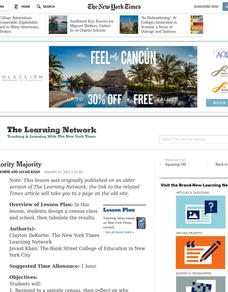Curated OER
Science Fair Space
Young scholars determine the most equitable way to share space and cost between three schools for a fictional science fair. Given a diagram, a word problem, and a data set, students analyze and explain the best way for all schools to...
Curated OER
Something Fishy (Statistics)
Students are introduced to a problem involving an environmental issue. They are introduced to the capture-recapture method which involves capturing fish, tagging them, returning them and recapturing another sample. Pupils work in...
Serendip
Evolution of Fur Color in Mice – Mutation, Environment and Natural Selection
Most species of animals include a variety of fur or hair color, but why? Scholars watch a video about a changing environment for mice. As the rocks around them change hues, different colors of mice begin to thrive. Discussion questions...
Howard County Schools
Constant Rate Exploration
Question: What do rectangles and bathtub volume have in common? Answer: Linear equations. Learn how to identify situations that have constant rates by examining two different situations, one proportional and one not proportional.
Curated OER
Algebra 1: Slope as Rate
Students solve problems with slopes. In this algebra lesson, students identify the slope of a line and relate it to the rate of change. They graph their lines on the TI and observe changes in the lines.
Curated OER
How Big is Barbie?
Learners measure various dimensions of a male and a female dolls body and scale them proportionally to average human measurements. They calculate the appropriate scale factor (magnitude) to enlarge their doll and apply that scale factor...
Curated OER
A Photosynthesis Timeline
Science learners discover that scientific advancements come in increments. Beginning as an idea, changes and developments are influenced by available resources and current societal values. As an example, pupils examine the conclusions...
Texas Education Agency (TEA)
Geometry in Architecture #1
Discover how to analyze architecture from a geometric standpoint. The fourth installment of an 11-part unit on architecture first provides a presentation on axis, balance, basic form, formal, pattern, proportion, symmetry, and tripartite...
Curated OER
The Virginia Plan and the New Jersey Plan: Student Worksheet
These guided reading questions accompany several websites on the development of the US Constitution. While some of the links have changed, they are still accessible. History or government classes benefit from reading primary source...
Curated OER
Measure for Measure
Young mathematicians work to recognize the relationship between their scale models of the Joides research vessel and the real vessel. They calculate the relationships between various parts of the ship using fractions, ratios, and...
University of Colorado
Can Photosynthesis Occur at Saturn?
In the 19th activity of 22, learners determine if distance from a light source affects photosynthesis. Participants capture oxygen in straws and find that the amount of water the gas displaces is proportional to the rate of photosynthesis.
California Education Partners
Speedy Texting
Model the effects of practice on texting speed. Pupils develop a linear equation that models the change in texting speed based on the amount of practice. The sixth performance task in an eight-part series requires learners to solve...
Curated OER
The Fourth Quadrant of Proportiona
Students experiment with scale to solve a problem presented in a video clip. They determine the correct size to use when constructing a model and evaluate the use of proportions in real life applications.
Curated OER
Math: "Scales"
Third graders investigate ratios and rates. In this third grade mathematics lesson, 3rd graders identify equal ratios and rate and test for proportionality. This lesson is created to be use in conjunctions with a particular...
Curated OER
Taste Test-- Ratios
In this math worksheet, students mix four "cocktails" of orange juice and lemonade in the different rations specified. Students rate the drinks and determine their favorite combination. Students answer 10 questions about the ratios in...
Curated OER
MOBILITY, Traveling Lightly: What’s My Footprint?
Students calculate their carbon footprint. In this environmental technology lesson, students listen to a lecture on climate change. Students brainstorm solutions to reduce environmental impact based on travel options. Students calculate...
Curated OER
Percent Application Worksheet
In this problem solving activity, students solve each of the ten word problems by using their knowledge of percent, proportions, simple interest, and sales tax.
Curated OER
Changing the Water in the Aquarium
Students discover the importance and how to change the water in an aquarium. As a class, they review the types of impurities that are found in water and discuss how to keep the tank as clean as possible. They develop a water change...
Curated OER
Family Recent Demographic Changes
In this Recent Demographic Changes instructional activity, students answer 14 questions in short written responses. Suggested point values are provided.
Curated OER
The Minority Majority
Students design a census class and school, then tabulate the results. They respond to a sample census, then reflect on why questions of race and national origin are different.
Mathalicious
New-tritional Info
Burning off a Big Mac® doesn't seem like a big feat until you calculate the minutes of exercise necessary to break even. Young mathematicians look at different menu items in relation to different body weights and exercises to calculate...
Math Stars
Math Stars: A Problem-Solving Newsletter Grade 6
Think, question, brainstorm, and make your way through a newsletter full of puzzles and word problems. The resource includes 10 different newsletters, all with interesting problems, to give class members an out-of-the box...
Mathalicious
Been Caught Stealing
You're safe, when calculating the odds of stealing second base! Learners compare the rate of a runner to the distance the ball travels, in a lesson that explores right triangles and measurement. Full of discussion questions and fun...
Curated OER
Numbers and Operations
Students practice using proportions to discover the fraction needed to use the right amount of an ingredient. They calculate the number of ounces in one gallon as well. They answer questions to complete the lesson.























